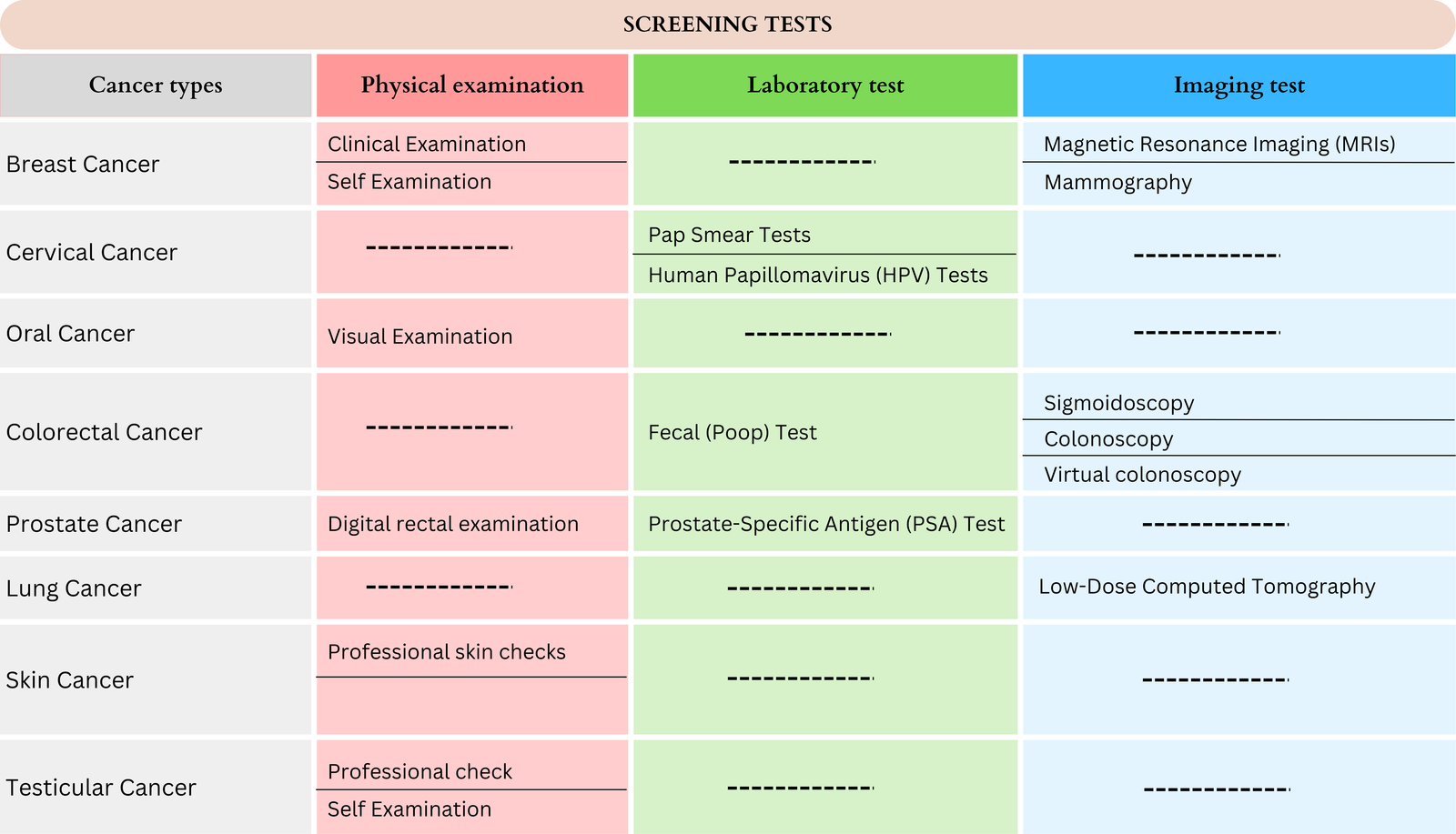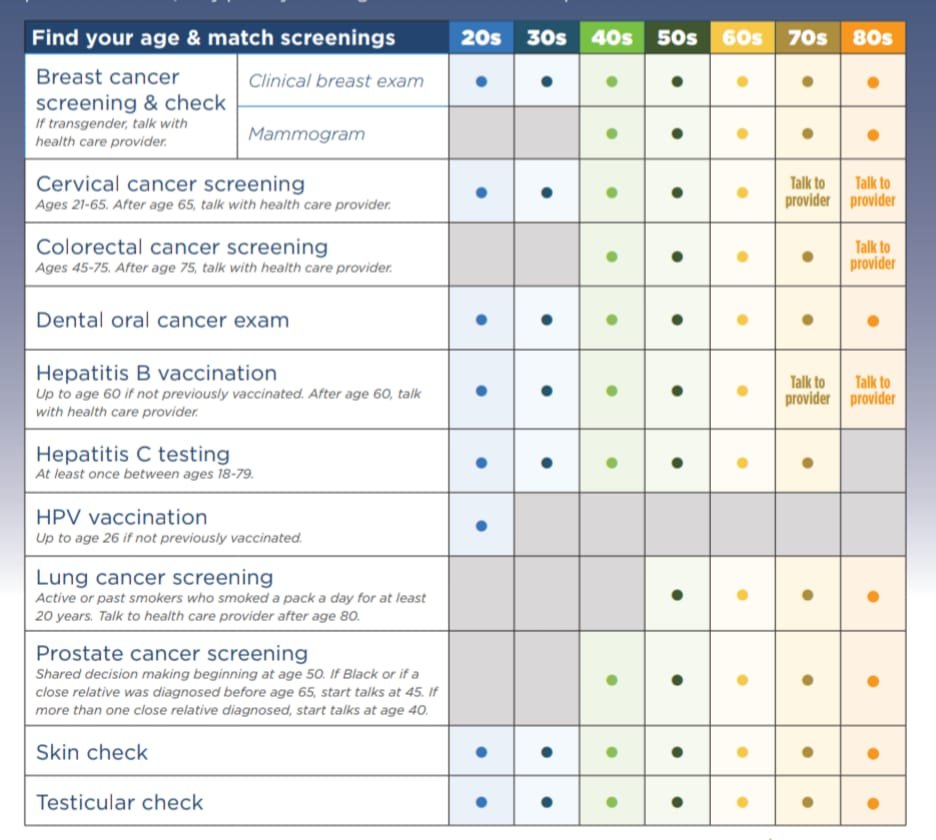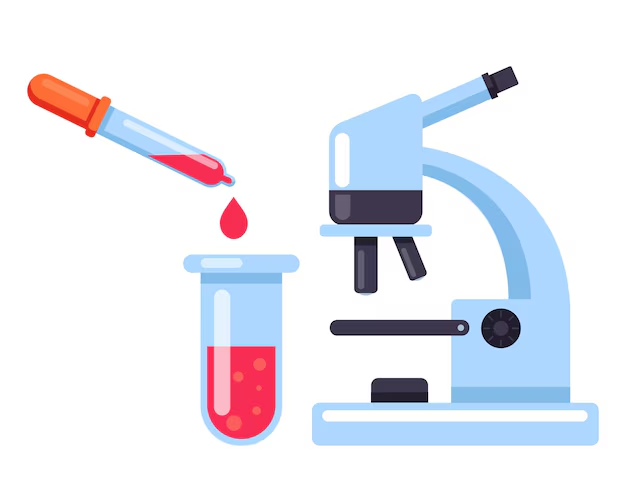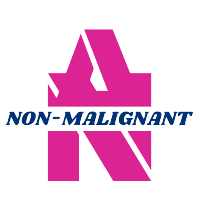WELCOME TO NON MALIGNANT’S MONTHLY NEWSLETTER
Screening Tests For Cancer
Hello, readers! We are excited to redeliver the latest information in cancer research to you our dedicated supporters
According to the national center for disease informatics and research 1 in 9 people in India are expected to face cancer diagnosis during their lifetime.
80% of patients with common cancer types such as breast, oral, lung, cervical in India are diagnosed at an advanced stage, significantly reducing the chances of survival.
However, the most common cancer types found in most of the cases are also the cancers that can be detected early. Furthermore, those 80% of patients have an increased chance of survival.
One way to do it is SCREENING!
Below we look at two things you need to know about screening: the test for screening and age for screening.
TEST FOR SCREENING
Cancer screening refers to the process of testing individuals who don’t show any symptoms of cancer with the primary goal of detecting cancer at an early stage when it is more treatable[1].
Screening is not a one way street but it is a combination of three different pathways meaning it is not a one single tool or a test which is being done but its a combination of:
Physical Examination: a healthcare provider checks for lumps, abnormal growths, or changes in the body that could indicate the presence of cancer.
Laboratory Tests: Lab tests analyze blood, urine, or tissue samples to look for specific cancer markers or abnormalities.
Imaging Tests: These tests create detailed pictures of areas inside the body using technologies like X-rays, CT scans, MRIs, or ultrasounds. Imaging helps detect tumors or abnormal growths that may not be visible through a physical exam or lab tests, providing crucial information for early diagnosis.
But there is a catch: one might wonder whether these pathways are applicable to all types of cancer?
Just like every single cancer type varies according to its unique conditions, its screening pathways also vary. Also screening is not available for all cancer types.
Learn more about test for screening at Cleveland clinic

Reference for the above table : cleveland clinic
AGE FOR SCREENING
It is important to understand that a 20-year-old individual does not face the same cancer risk as a 45-year-old. Therefore, determining which type of cancer screening an individual requires depends largely on their age[2].
However, there are exceptions, particularly for individuals with a family history of cancer.
The figure provided by the Prevent Cancer Foundation summarizes the recommended ages for different cancer screenings.
It’s also important to note that people at higher risk due to a previous pre-cancerous condition or family history should consult medical professionals, as their screening guidelines may differ from those for the general population.
Learn More about age for screening at American Cancer Society

Reference for the above table : Prevent Cancer Foundation
Revolutionizing Cancer Detection: The Galleri Test and Its Role in Early Screening
Current screening methods are effective; however, they have limitations, such as the inability to screen for all cancer types, the potential for false results, and the risk of overdiagnosis. To address these challenges, researchers have developed an innovative technology: a blood test that can detect 50 types of cancer. This blood test, known as the Galleri test, is designed to significantly enhance early detection.
This multi-cancer early detection (MCED) blood test analyzes cell-free DNA to identify over 50 types of cancer, including cancers like pancreatic and ovarian cancer, which often go undetected until it’s too late. The Galleri test aims for approximately 90% accuracy in pinpointing the cancer’s likely origin by leveraging cutting-edge DNA sequencing and machine learning—because even cancer detection benefits from a touch of technological advancement.
However, it’s important to note that it’s not all sunshine and rainbows; this test has a sensitivity of only 51.5%, which means it might overlook some cancers, leaving some patients wondering if their cancer is just playing hide-and-seek. Therefore currently Galleri test does not operate alone; it works alongside existing screening methods due to its low sensitivity rate[3].

RELATED ARTICLES
Did you like this newsletter
Know who we are
Non Malignant is a startup aimed at detecting and eliminating cancer before symptoms appear. Non Malignant is housed at Mission Unicorn which is an ideation and incubation lab in Vidyalankar.
Non Malignant is also a service provider for all information regarding detection, cure, rehabilitation and prevention of cancer.
Stay connected with us!
Get updates, valuable insights, and important announcements delivered directly to your inbox. Join our mailing list today and be the first to know about the newest developments, events, and resources available to you
hello@nonmalignant.org
References
1. https://my.clevelandclinic.org/health/diagnostics/24118-cancer-screening
2. https://www.cancer.org/cancer/screening/screening-recommendations-by-age.html
3. https://health.clevelandclinic.org/the-galleri-test
